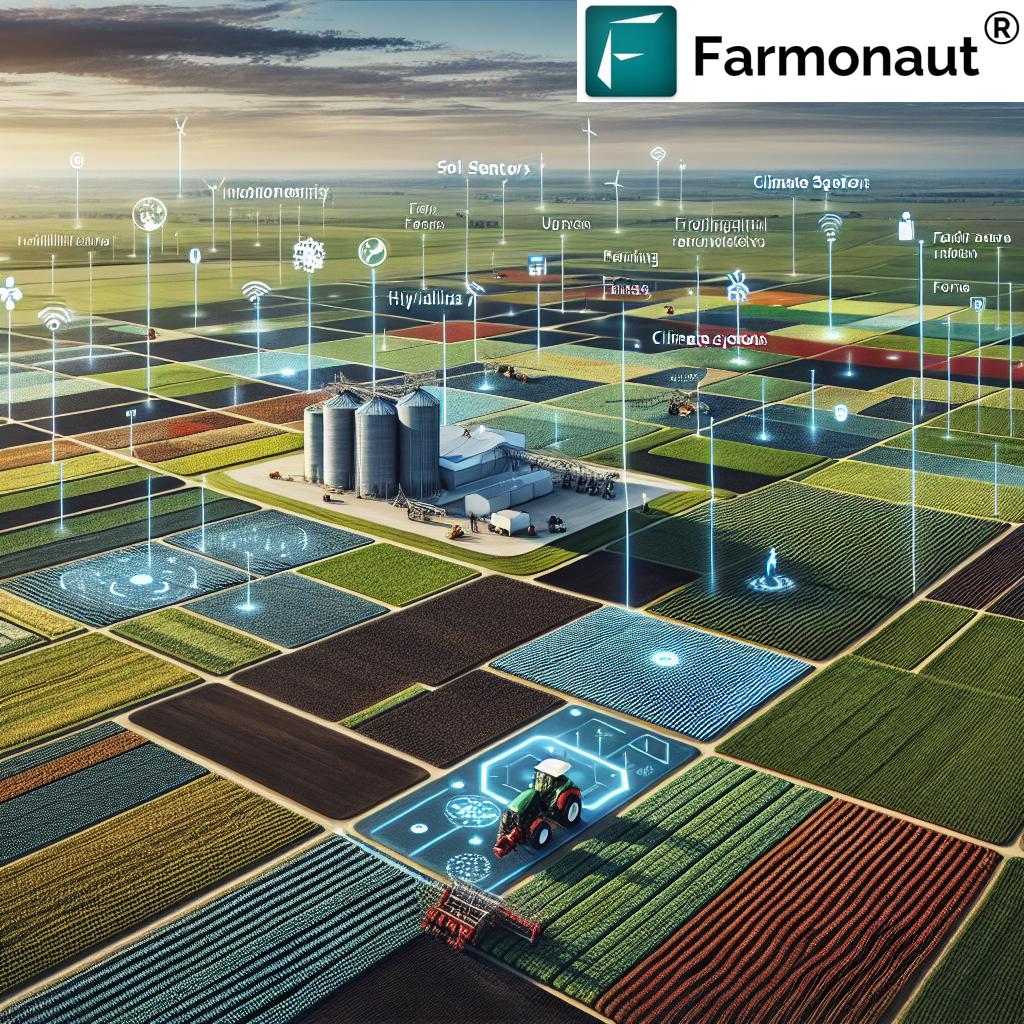Farmonaut’s Guide to Midwest Ag Tech: Boosting Crop Yields with Smart Farming Solutions

“Precision agriculture techniques can increase crop yields by up to 30% while reducing water usage by 20-50%, according to recent studies.”
Welcome to Farmonaut’s comprehensive guide on the latest agricultural technology trends and farm management solutions transforming the Midwest’s agricultural landscape. In this blog, we’ll explore how precision agriculture techniques are revolutionizing crop yield optimization and sustainable farming practices across states like Illinois, Indiana, Iowa, Michigan, Ohio, and Wisconsin. From digital agriculture platforms to smart farming systems, we’re delving deep into the cutting-edge agritech innovations shaping the future of farming in America’s heartland.
As we navigate through the rapidly evolving world of agricultural technology, we’ll uncover how agricultural data analytics and remote sensing in agriculture are transforming decision-making processes for farmers. We’ll also keep you informed about market trends, weather impacts, and policy changes affecting key crops like corn and soybeans. Whether you’re a farmer, an agribusiness professional, or a policymaker, this blog offers valuable insights into the intersection of technology and agriculture, paving the way for a more efficient and sustainable future in farming.
The Rise of Smart Farming in the Midwest
The Midwest, often referred to as America’s breadbasket, is experiencing a technological revolution in its agricultural practices. Smart farming, also known as precision agriculture, is at the forefront of this transformation. Let’s explore how these advanced technologies are reshaping the agricultural landscape:
- Satellite-Based Crop Monitoring: Companies like Farmonaut are leveraging satellite imagery to provide real-time insights into crop health, soil moisture levels, and vegetation indices. This technology allows farmers to make data-driven decisions about irrigation, fertilization, and pest management.
- IoT Sensors and Connected Devices: The Internet of Things (IoT) has made its way to Midwest farms, with sensors collecting data on soil conditions, weather patterns, and crop growth. This constant stream of information enables farmers to optimize resource use and respond quickly to changing conditions.
- AI and Machine Learning: Artificial Intelligence algorithms are being employed to analyze vast amounts of agricultural data, providing predictive insights and personalized recommendations for crop management.
- Drone Technology: Unmanned aerial vehicles (UAVs) are becoming increasingly popular for crop scouting, enabling farmers to quickly assess large areas and identify issues such as pest infestations or nutrient deficiencies.
These smart farming solutions are not just improving efficiency; they’re also contributing to more sustainable agricultural practices across the Midwest.
Precision Agriculture Techniques for Midwest Crops
Precision agriculture is tailored to meet the specific needs of Midwest crops, particularly corn and soybeans. Here’s how these techniques are being applied:
- Variable Rate Technology (VRT): This allows for precise application of inputs like seeds, fertilizers, and pesticides based on soil variability and crop needs within a field.
- GPS-Guided Machinery: Tractors and other farm equipment equipped with GPS guidance systems ensure accurate planting, spraying, and harvesting, reducing overlap and improving efficiency.
- Soil Mapping: Detailed soil maps created through remote sensing and on-ground sampling help farmers understand the variability in their fields and make informed decisions about crop management.
- Crop Modeling: Advanced software uses historical data, current conditions, and predictive analytics to model crop growth and potential yields, aiding in decision-making throughout the growing season.
These precision agriculture techniques are not only boosting crop yields but also promoting sustainable farming practices by optimizing resource use and reducing environmental impact.
Digital Agriculture Platforms: The New Frontier
Digital agriculture platforms are becoming indispensable tools for Midwest farmers. These platforms integrate various data sources and provide actionable insights through user-friendly interfaces. Here’s what makes them crucial:
- Centralized Data Management: Farmers can access all their agricultural data in one place, from crop health metrics to equipment performance.
- Real-Time Monitoring: Continuous updates on weather conditions, market prices, and crop status enable timely decision-making.
- Predictive Analytics: Advanced algorithms predict potential issues like pest outbreaks or disease spread, allowing for proactive management.
- Integration with Farm Equipment: Many platforms can interface directly with smart farming equipment, streamlining operations and data collection.
Farmonaut’s digital agriculture platform, for instance, offers a comprehensive suite of tools for farm management, including satellite-based crop monitoring, AI-driven advisory systems, and blockchain-based traceability solutions. To explore these features, visit our web app or download our mobile apps:
Agricultural Data Analytics: Turning Information into Action
The power of agricultural data analytics lies in its ability to transform raw information into actionable insights. Here’s how it’s making a difference in Midwest agriculture:
- Yield Prediction: By analyzing historical data, current conditions, and predictive models, farmers can estimate yields more accurately, aiding in marketing and financial planning.
- Resource Optimization: Data analytics helps identify areas of inefficiency in water usage, fertilizer application, and other inputs, leading to cost savings and reduced environmental impact.
- Risk Management: Advanced analytics can assess various risk factors, from weather-related threats to market volatility, helping farmers make informed decisions about crop insurance and financial strategies.
- Benchmarking: Farmers can compare their performance against industry standards and peers, identifying areas for improvement and best practices.
For developers and businesses looking to integrate powerful agricultural data analytics into their systems, Farmonaut offers a robust API. Learn more about our API capabilities here and explore our API Developer Docs for detailed information.

Remote Sensing in Agriculture: A Game-Changer for Midwest Farmers
Remote sensing technology is revolutionizing how Midwest farmers monitor and manage their crops. Here’s why it’s becoming an essential tool:
- Wide-Area Coverage: Satellite imagery allows for monitoring of large agricultural areas quickly and efficiently.
- Frequent Updates: Regular satellite passes provide up-to-date information on crop health and field conditions.
- Multi-Spectral Analysis: Different spectral bands can reveal information about crop stress, nutrient deficiencies, and water status that may not be visible to the naked eye.
- Historical Comparisons: Farmers can compare current crop conditions with historical data to identify trends and anomalies.
Farmonaut’s remote sensing capabilities offer Midwest farmers a powerful tool for crop monitoring and decision-making. Our satellite-based crop health monitoring system provides valuable insights into vegetation health (NDVI), soil moisture levels, and other critical metrics.
“The global smart farming market is projected to reach $23.14 billion by 2025, growing at a CAGR of 9.8% from 2020.”
Market Trends and Weather Impacts on Midwest Agriculture
Understanding market trends and weather patterns is crucial for Midwest farmers. Here’s how these factors are influencing agricultural decisions:
- Commodity Prices: Fluctuations in corn and soybean prices significantly impact planting decisions and marketing strategies.
- Global Demand: Changes in international markets, particularly in countries like China, can have a substantial effect on Midwest crop exports.
- Climate Change: Shifting weather patterns are leading to changes in growing seasons and increased risk of extreme weather events.
- Drought Monitoring: Advanced weather forecasting and soil moisture monitoring help farmers prepare for and mitigate the effects of drought conditions.
Farmonaut’s platform integrates market data and weather forecasts, providing farmers with a comprehensive view of factors affecting their operations. This information, combined with our crop monitoring tools, enables more informed decision-making throughout the growing season.
Policy Changes Affecting Midwest Agriculture
Agricultural policies have a significant impact on Midwest farmers. Stay informed about these key areas:
- Farm Bill: This comprehensive legislation, renewed every five years, shapes agricultural and food policy at the federal level.
- Trade Agreements: International trade policies can significantly affect export markets for Midwest crops, particularly soybeans and corn.
- Environmental Regulations: Policies related to water quality, soil conservation, and carbon emissions are increasingly impacting farming practices.
- Renewable Energy Policies: Ethanol mandates and incentives for biofuel production continue to influence corn markets in the Midwest.
Staying informed about these policy changes is crucial for Midwest farmers to adapt their strategies and remain competitive in the global market.
Sustainable Farming Practices in the Midwest
Sustainability is becoming increasingly important in Midwest agriculture. Here are some key practices gaining traction:
- Cover Cropping: Planting cover crops between growing seasons helps improve soil health, reduce erosion, and increase organic matter.
- Conservation Tillage: Reduced tillage practices help preserve soil structure and reduce carbon emissions.
- Precision Nutrient Management: Using data-driven approaches to apply fertilizers more efficiently, reducing runoff and improving water quality.
- Integrated Pest Management (IPM): Combining biological, cultural, and chemical methods to control pests while minimizing environmental impact.
Farmonaut supports these sustainable practices through our precision agriculture tools, helping farmers optimize resource use and reduce environmental impact.
The Future of Midwest Agriculture: Emerging Technologies
As we look to the future, several emerging technologies are poised to further transform Midwest agriculture:
- Autonomous Farming Equipment: Self-driving tractors and harvesters are becoming more advanced, promising to increase efficiency and reduce labor costs.
- Gene Editing: CRISPR and other gene-editing technologies offer the potential to develop crops with improved traits, such as drought resistance or enhanced nutritional content.
- Vertical Farming: While primarily associated with urban areas, vertical farming techniques are being adapted for certain high-value crops in the Midwest.
- Blockchain in Agriculture: Blockchain technology is being explored for improving traceability in the food supply chain, from farm to consumer.
Farmonaut is at the forefront of these technological advancements, continuously updating our platform to incorporate the latest innovations in agricultural technology.
Top Smart Farming Solutions for Midwest Crops
To provide a clear overview of the most effective smart farming solutions for Midwest agriculture, we’ve compiled this comparison table:
| Technology | Primary Crop Application | Key Benefits | Estimated Yield Increase |
|---|---|---|---|
| Precision irrigation systems | Corn, Soybeans | Water conservation, improved crop health | 10-15% |
| Drone-based crop monitoring | All major crops | Early stress detection, targeted treatments | 5-10% |
| AI-powered pest detection | Corn, Soybeans, Wheat | Reduced pesticide use, early intervention | 8-12% |
| IoT soil sensors | All crops | Optimized fertilizer use, improved soil health | 7-15% |
| Satellite-based crop health monitoring | All major crops | Large-scale monitoring, early issue detection | 10-20% |
This table highlights the diverse range of smart farming solutions available to Midwest farmers, each offering significant potential for yield improvement and resource optimization.
Industry Events and Conferences
Staying connected with the latest developments in agricultural technology is crucial for Midwest farmers. Here are some key events and conferences to consider:
- Farm Progress Show: The nation’s largest outdoor farm event, showcasing the latest in farm equipment and technology.
- Commodity Classic: America’s largest farmer-led, farmer-focused agricultural and educational experience.
- AgTech Expo: Focusing on the intersection of technology and agriculture, this expo highlights innovative solutions for modern farming.
- Precision Agriculture Conference: An event dedicated to the latest advancements in precision farming techniques and technologies.
These events offer valuable opportunities for networking, learning about new technologies, and staying informed about industry trends.
Farmonaut’s Role in Midwest Agriculture
As a pioneering agricultural technology company, Farmonaut is committed to making precision agriculture accessible and affordable for Midwest farmers. Our platform offers:
- Satellite-Based Crop Monitoring: Real-time insights into crop health and field conditions.
- AI-Driven Advisory System: Personalized recommendations for crop management based on data analysis.
- Blockchain-Based Traceability: Enhancing transparency and trust in agricultural supply chains.
- Resource Management Tools: Optimizing the use of water, fertilizers, and other inputs.
By leveraging these technologies, Midwest farmers can make more informed decisions, increase productivity, and promote sustainable farming practices.
Explore Farmonaut’s solutions for yourself:
Conclusion: Embracing the Future of Midwest Agriculture
The agricultural landscape in the Midwest is undergoing a profound transformation, driven by advances in technology and a growing focus on sustainability. From precision agriculture techniques to smart farming systems, the tools available to farmers today offer unprecedented opportunities for improving efficiency, increasing yields, and reducing environmental impact.
As we’ve explored in this guide, the integration of satellite technology, AI, IoT, and data analytics is revolutionizing every aspect of farming, from planting and crop management to harvesting and market analysis. Companies like Farmonaut are at the forefront of this revolution, providing accessible and affordable solutions that empower farmers to make data-driven decisions and optimize their operations.
The future of Midwest agriculture is bright, with emerging technologies promising even greater advancements in the years to come. By staying informed about the latest trends, embracing innovative solutions, and prioritizing sustainable practices, Midwest farmers can ensure their continued success and contribute to a more resilient and productive agricultural sector.
We encourage all stakeholders in Midwest agriculture – from individual farmers to agribusinesses and policymakers – to explore the possibilities offered by these new technologies. Together, we can build a more efficient, sustainable, and prosperous future for agriculture in the heartland of America.
Frequently Asked Questions (FAQ)
- What is precision agriculture?
Precision agriculture is a farming management concept that uses technology to observe, measure, and respond to variability in crops. It aims to optimize returns on inputs while preserving resources. - How can satellite imagery benefit Midwest farmers?
Satellite imagery provides real-time data on crop health, soil moisture, and field conditions, allowing farmers to make informed decisions about irrigation, fertilization, and pest management. - What is the role of AI in modern farming?
AI in farming can analyze vast amounts of data to provide predictive insights, personalized recommendations, and automate decision-making processes, leading to improved efficiency and crop yields. - How does Farmonaut’s platform differ from other agricultural technology solutions?
Farmonaut offers an integrated platform that combines satellite-based crop monitoring, AI-driven advisory systems, and blockchain-based traceability, making advanced agricultural technology accessible and affordable for farmers of all scales. - What are the main challenges facing Midwest agriculture today?
Key challenges include climate change impacts, water management, soil health preservation, market volatility, and adapting to new technologies while maintaining profitability.
Farmonaut Subscription Plans
Explore our subscription options to find the perfect plan for your farming needs:
By leveraging Farmonaut’s advanced agricultural technology solutions, Midwest farmers can stay at the forefront of innovation, optimize their operations, and contribute to a more sustainable and productive agricultural future.






